PLEASE NOTE:
While the following article relates to your Google search, the services and methods at Goodwin Hypnosis may differ from those mentioned below. Since 2007, we have helped thousands of clients to overcome emotional and behavioral challenges when all else had failed. According to many of them (and their referring healthcare providers), our methods are faster than talk therapy, easier than willpower, and safer than medication. If you’re ready to resolve your issues, skip the article and visit the rest of our website, where you can learn about our unique approach, watch client testimonial videos, and discover how working with us one-on-one could be the solution you’ve been searching for.
We can help you with a variety of issues relating to emotional trauma. While we don't diagnose disorders like PTSD, we have helped hundreds of clients to overcome a wide range of traumatic experiences and their negative effects with methods that are more efficient and comfortable than CBT or EMDR. If you would like to learn more about working with us one-on-one to clear your trauma, click here.
Introduction
In a world where the complexities of trauma are often misunderstood, unraveling the myths surrounding Post-Traumatic Stress Disorder (PTSD) is essential for fostering a compassionate and informed society. Many people believe that PTSD is exclusive to veterans or those who have experienced extreme trauma, but the reality is far broader, impacting a significant portion of the population from various walks of life. With approximately 7 to 8 percent of individuals experiencing PTSD at some point, it becomes crucial to recognize that trauma can stem from a myriad of situations, including accidents, personal loss, or natural disasters.
By addressing these misconceptions and sharing real stories of healing, such as those who have found relief through innovative therapeutic techniques, the conversation can shift towards understanding and support. This exploration not only highlights the importance of accurate information but also emphasizes the transformative potential of compassion and connection on the journey to recovery.
Debunking Common Myths About PTSD
Misunderstandings about post-traumatic stress disorder often cloud the perception of those who endure its challenges, making it crucial to address these misconceptions with compassion. A common myth is that post-traumatic stress disorder only impacts veterans or those who have encountered severe forms of trauma. In truth, post-traumatic stress disorder can impact anyone, regardless of their background.
Studies show that approximately 7 to 8 percent of the U.S. population will encounter post-traumatic stress disorder at some point, with women being twice as likely to endure it compared to men. As Katie Lange from DoD News states,
'About 7 to 8 percent of the U.S. population will experience post-traumatic stress disorder at some point in their lives.'
This statistic highlights the necessity to acknowledge the varied array of situations that can result in post-traumatic stress disorder, including:
- Accidents
- Natural disasters
- Personal loss
For example, Vanessa's journey demonstrates how Todd's enjoyable and effective therapeutic method, which incorporates techniques such as NLP (neuro-linguistic programming) and memory reconsolidation, assisted her in overcoming years of trauma, anxiety, burnout, and depression. Similarly, Amber's experience demonstrates how she was able to alleviate her trauma symptoms and sorrow through Gina's innovative techniques, leading to a profound improvement in her quality of life. Amber expressed,
'In just a few key moments in our sessions, she was able to effectively clear what traditional therapy and EMDR could not clear in MONTHS.'
Another damaging misconception is that people with post-traumatic stress disorder are 'broken' or unable to recover. This perception is far from reality; with effective treatment options, such as therapy and innovative approaches like hypnosis, many individuals find pathways to recovery and can lead fulfilling lives.
Case studies reveal that survivors of car accidents and natural disasters often experience post-traumatic stress disorder, highlighting that the condition is not exclusive to military personnel. By dismantling these myths and fostering a deeper understanding of post-traumatic stress, we can create a more empathetic environment that supports those affected on their journey toward healing.
Recent discussions in the media also emphasize the importance of recognizing post-traumatic stress disorder in various demographics, further reinforcing the need for inclusive awareness and support. Comprehending the symptoms of post-traumatic stress disorder, which may involve intrusive flashbacks, hypervigilance, and difficulty sleeping, is crucial for acknowledging its effects and promoting effective treatment.
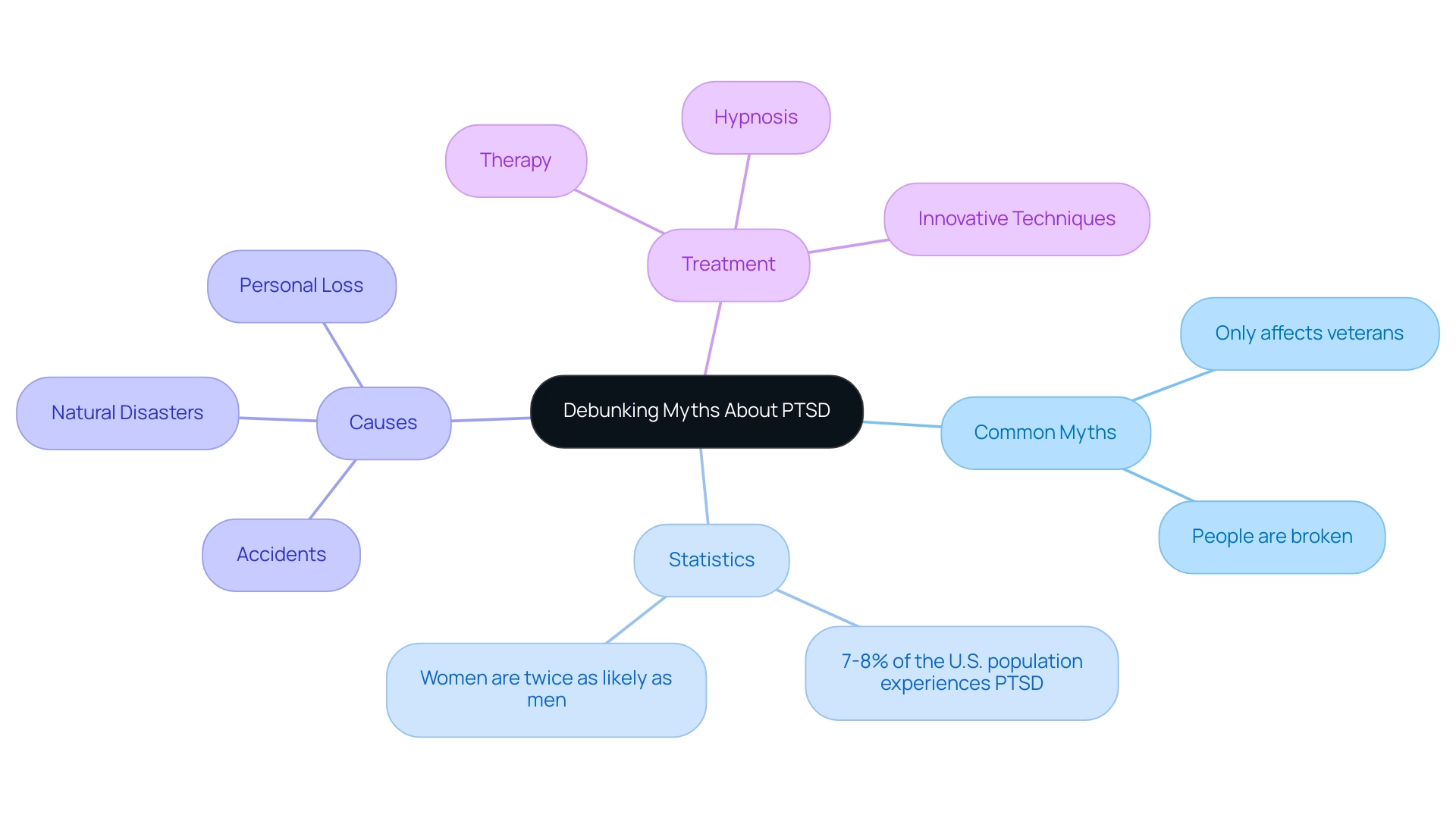
The Facts Behind PTSD: What You Need to Know
Comprehending the realities of post-traumatic stress disorder is crucial for anyone who wishes to support trauma survivors. Roughly 7-8% of the population will encounter trauma-related stress disorder at some point in their lives, emphasizing its commonality and significant impact. It's important to note that only around 50% of individuals with trauma-related disorders seek treatment, underscoring the need for awareness and support for those affected. Symptoms can be deeply unsettling, including:
- Flashbacks
- Nightmares
- Severe anxiety
- Persistent, uncontrollable thoughts about the traumatic event
Post-traumatic stress disorder can arise right after a traumatic incident or may appear years later, complicating the recovery process. As stated, "PTSD is a common mental health condition that affects millions of people around the world."
Trauma can arise from various situations such as:
- Sexual assault
- Violent crime
- Emotional abuse
Understanding these distinctions is vital for effective support. Fortunately, various treatment options, such as:
- Cognitive-behavioral therapy
- Exposure therapy
- Hypnotherapy
have proven effective in addressing the emotional dimensions of trauma. Techniques like hypnosis and NLP (Neuro-Linguistic Programming) focus on reprogramming the subconscious mind to alleviate the emotional pain associated with traumatic memories. Personal experiences, such as Amber's journey overcoming trauma and grief through innovative techniques, illustrate the potential for transformation and healing.
June is acknowledged as Trauma Awareness Month, highlighting the significance of comprehending this condition and its symptoms, along with the essential role of treatment. By equipping ourselves with accurate information, including the nature of distress and the specific healing techniques available, we can cultivate a more supportive environment, fostering understanding and compassion for those navigating the challenges of PTSD.
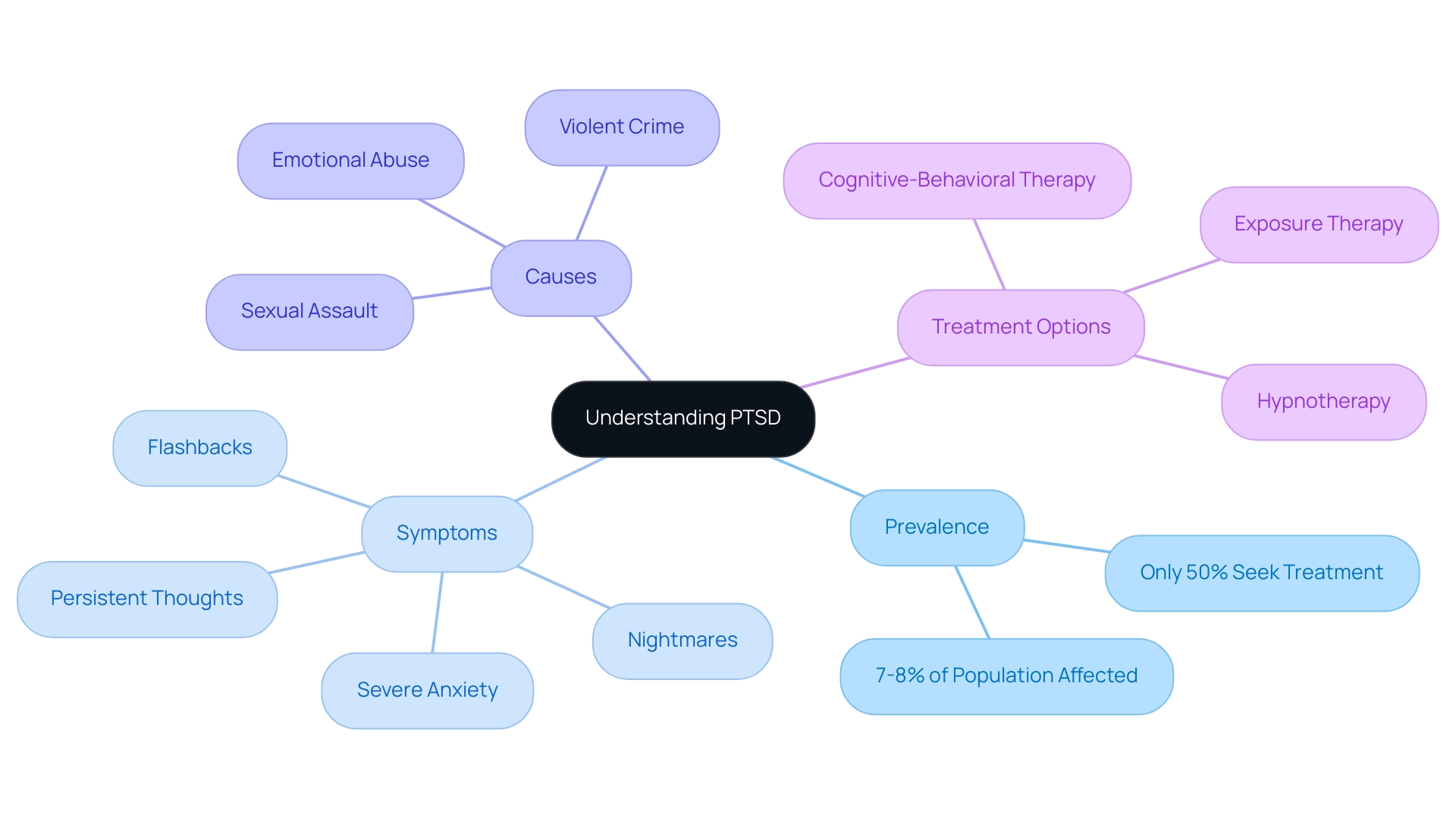
Myth: Trauma Only Affects Those Who Show Symptoms
A widespread misunderstanding is that emotional distress exclusively affects individuals who visibly exhibit symptoms. Yet, many individuals bear their emotional pain silently, often without showing clear signs of distress. In fact, statistics indicate that a staggering 94.3% of women with schizophrenia have encountered at least one distressing event in adulthood, highlighting the widespread nature of such experiences among those who may not outwardly reveal it.
This silent suffering can lead to misunderstandings and a lack of support from loved ones who may not recognize the internal struggles that survivors endure. As one father of a man living with serious mental illness poignantly shared,
- 'My son is so strong and aggressive... I am accountable for any damage he does to other people and their properties.'
This demonstrates the significant effect that unspoken emotional pain can have not only on people, but also on their families.
It’s essential to understand that each individual processes distress in their own way; just because someone appears fine on the outside does not mean they are not grappling with profound emotional pain. Moreover, people with severe mental health conditions have reported encountering distress during efforts to pursue mental health care, including physical abuse and being forcibly restrained. This adds another layer to the complexity of trauma.
Traditional therapy can sometimes fall short, leaving individuals feeling stuck and unsupported. By fostering an atmosphere of open dialogue about mental health, we can cultivate a more supportive community for those who may be struggling quietly, allowing them the space to share their stories and seek the help they need.
At Goodwin Hypnosis, we focus on addressing these underlying issues through innovative techniques like hypnosis, which includes methods such as NLP (neuro-linguistic programming) and memory reconsolidation. These approaches have proven transformative for many clients seeking healing from their past experiences.
If you’re seeking a supportive and effective method to tackle emotional distress, consider exploring the one-on-one services at Goodwin Hypnosis.
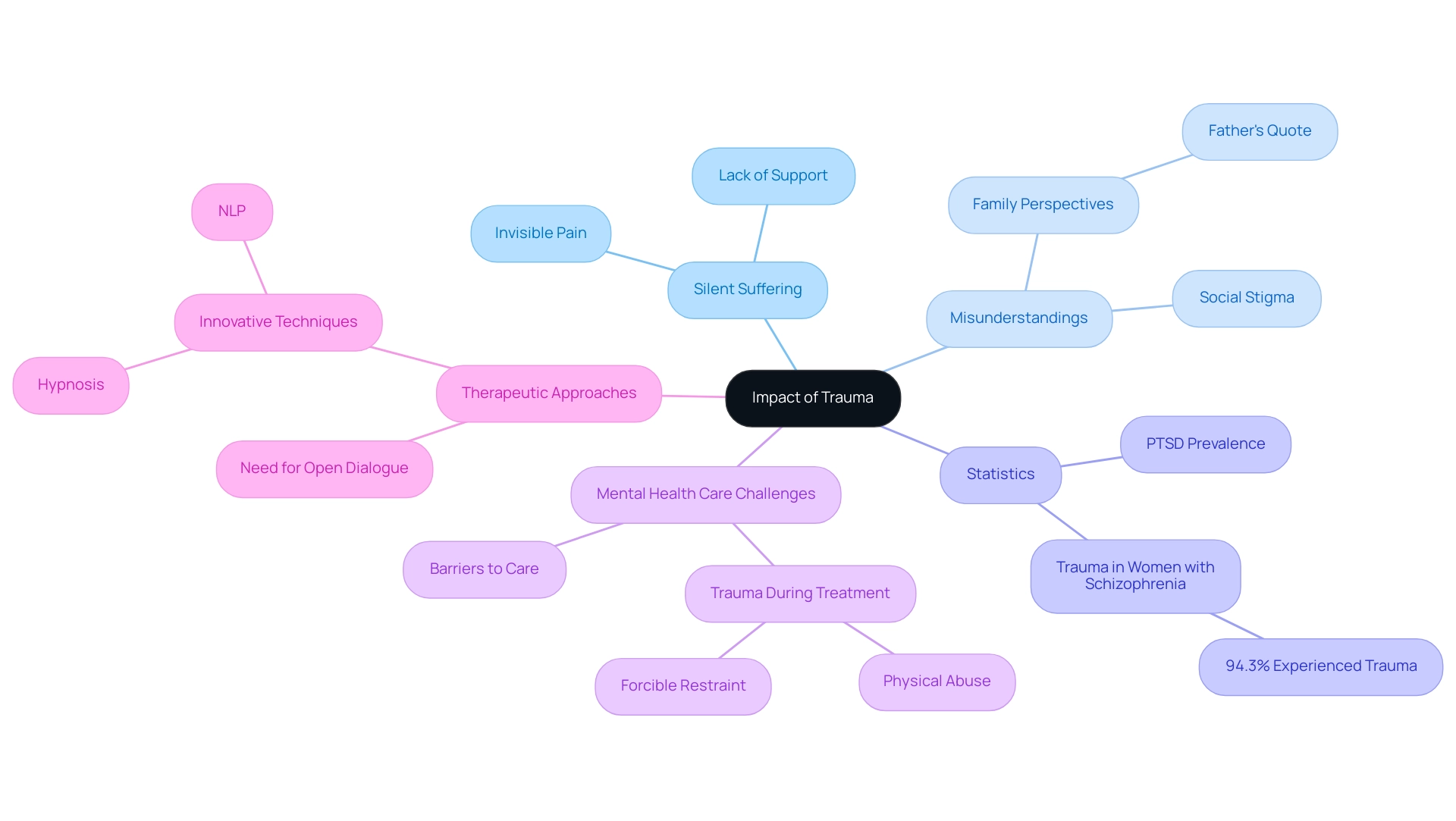
Myth: Talking About Trauma Makes It Worse
A common myth surrounding distress is the belief that discussing it will only deepen one's pain. In truth, engaging in discussions about traumatic events can be a transformative step in the healing journey, especially when combined with methods like hypnosis and NLP. Sharing personal stories, such as Jen's struggle with smoking relapse caused by pandemic-related stress, often results in validation and connection, aiding in reducing feelings of isolation and shame that many survivors experience.
Studies indicate that people who talk about their traumatic events are 50% more likely to report better mental health results over time. Therapeutic methods, particularly narrative therapy, underscore the power of storytelling in recovery. For instance, therapist Dr. Jane Smith states, 'Talking about trauma can be the first step toward reclaiming one’s narrative and finding peace.' By articulating their experiences, people can reframe their narratives, gaining new perspectives that foster emotional relief and personal growth.
A case study titled 'Sticking With Counseling' revealed that clients who participated in narrative therapy reported significant improvements in coping strategies and emotional regulation. Similarly, Jane's journey from emotional eating to weight loss highlights how reframing traumatic memories through hypnosis can transform one's relationship with food and self-image.
Establishing secure environments for sharing is essential, as it enables people to express themselves freely, without fear of judgment. Comprehending the significant advantages of addressing distress, along with the assistance offered through our Zoom-based emotional recovery program, can enable people to pursue the support they require and accept the healing journey.
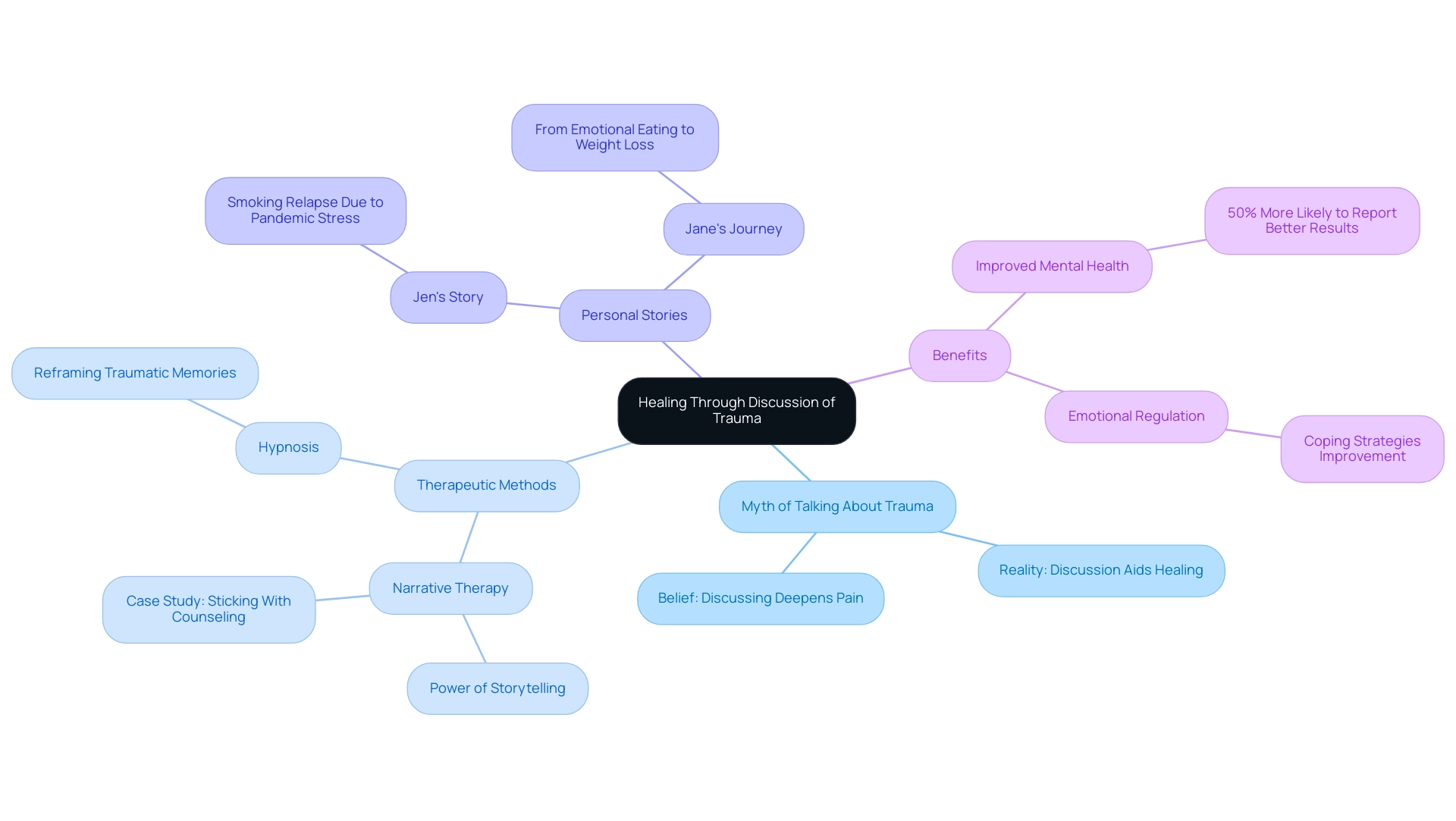
Myth: Healing from Trauma is a Linear Process
A common misconception is that healing from distress follows a straightforward path, with individuals steadily advancing toward recovery. In reality, this journey is often cyclical, marked by setbacks, relapses, and moments of stagnation. As Judith Lewis Herman explains, following distressing experiences, our instinct for self-preservation keeps us in a heightened state of alertness, complicating recovery. Approximately 20% of those who experience distress may develop Post Traumatic Stress Disorder (PTSD), underscoring the profound impact of such experiences.
Therapeutic services that utilize hypnosis and NLP can play a crucial role in addressing the root causes of emotional distress, promoting personal transformation, and facilitating recovery. Factors such as the type of trauma, the availability of a supportive network, and effective coping strategies significantly influence recovery rates. Recognizing that healing is not linear encourages individuals to practice self-compassion during challenging times. It’s vital to celebrate even the smallest achievements along this path and understand that emotional balance can fluctuate.
As David Brooks poignantly notes, 'The victims of post-traumatic stress disorder often feel trapped in a sort of spiritual solitary detention, looking at the rest of the world from beyond the barrier of what happened.' This highlights the isolation many feel, reinforcing the need for understanding and support. Seeking professional guidance, such as through the private programs at Goodwin Hypnosis, is invaluable, as it provides the necessary support and direction through the complexities of this process.
Our one-on-one sessions are structured to offer personalized support, focusing on the unique needs of each client. We also offer an affordable, 30-day online program with a money-back guarantee, ensuring you can begin your journey to recovery with confidence. A case study titled 'Approaching Healing' illustrates that effective recovery from distress requires patience, empathy, and a supportive environment that encourages self-expression and emotional exploration.
As Michel Templet insightfully points out, being diagnosed with PTSD is not a sign of weakness; rather, it is a testament to one’s strength and resilience in navigating this intricate journey. Take the first step toward recovery today and explore how Goodwin Hypnosis can support you in overcoming emotional trauma.
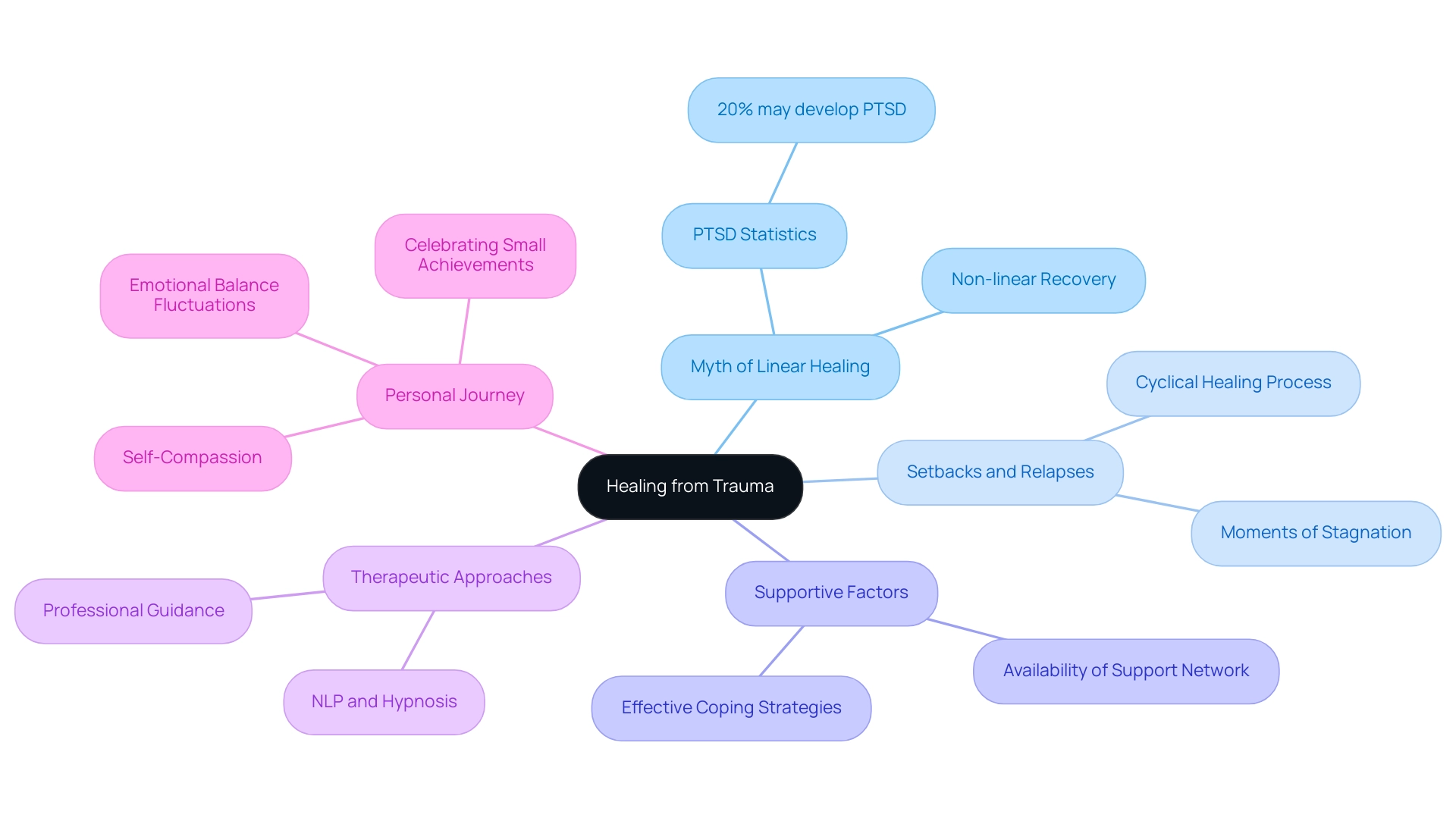
Conclusion
Recognizing the complexities of PTSD is vital in creating a more compassionate society. The article highlights that PTSD affects a diverse range of individuals, not just veterans or those who have experienced extreme trauma. Approximately 7 to 8 percent of the population will encounter this condition at some point in their lives, emphasizing the importance of understanding the various sources of trauma, from personal loss to natural disasters.
Addressing common myths about PTSD is crucial for fostering empathy and support. The belief that trauma only impacts those who show visible symptoms or that discussing trauma exacerbates the pain is misleading. Many individuals silently struggle with their experiences, and encouraging open conversations can lead to healing and validation.
Moreover, the journey of recovery is often non-linear; recognizing this can help individuals practice self-compassion and seek the necessary support along the way.
Ultimately, understanding PTSD and its implications paves the way for a more inclusive and supportive environment for those affected. By dismantling misconceptions and embracing effective treatment options, such as innovative therapeutic techniques, society can assist individuals on their healing journeys. Everyone deserves the opportunity to reclaim their narrative and find peace, and through collective awareness and compassion, a path to recovery becomes more accessible for all.




